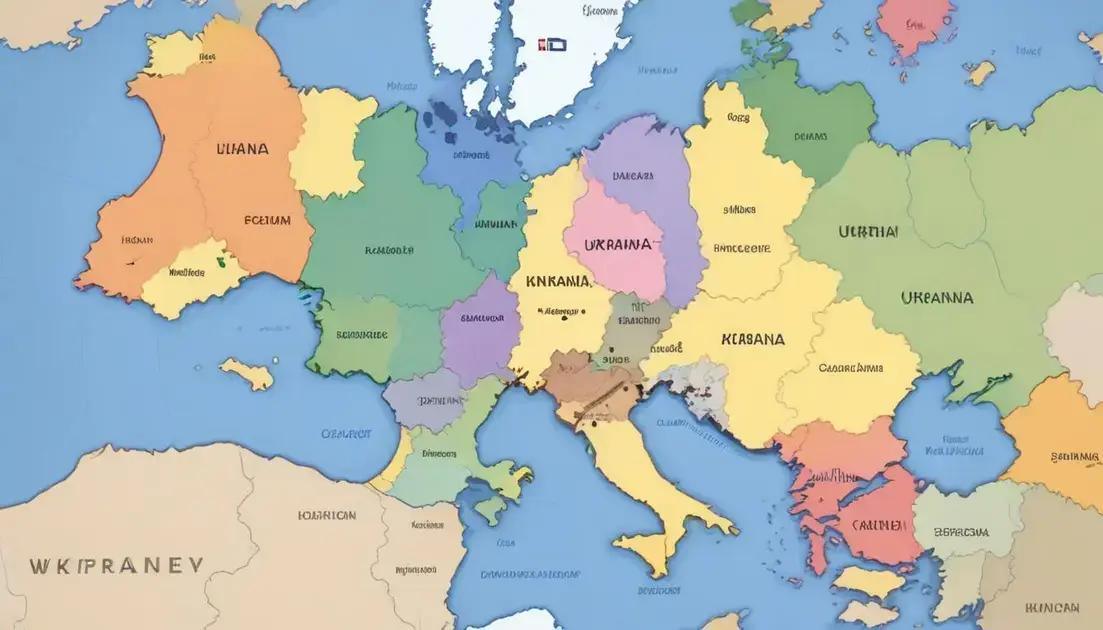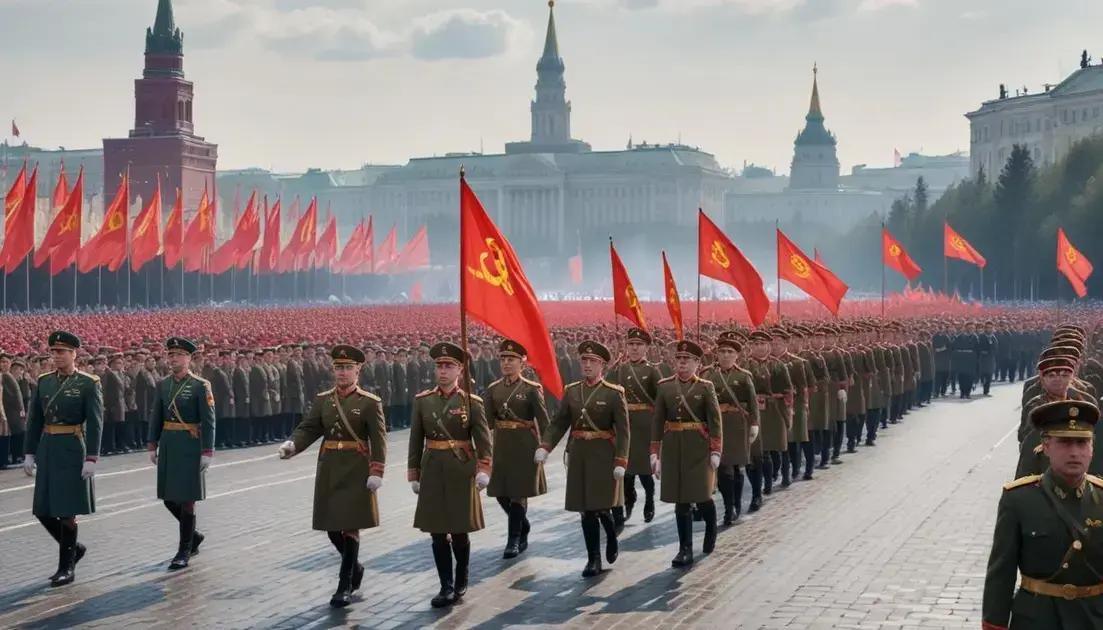
Ukraine: The Epicenter of the New Cold War
The ongoing conflict in Ukraine significantly affects global diplomacy, reshaping relationships between Eastern and Western nations. Public sentiment reflects strong nationalism and unity among Ukrainians, while cultural responses, expressed through art and community events, showcase resilience and hope. As countries reassess alliances and energy policies, the situation highlights the importance of supporting Ukraine in its pursuit of stability and security.
In today’s landscape, Cold War tensions are back on the rise, with Ukraine at the center of renewed confrontations. What does this mean for the future of global politics?
Historical context of the Cold War
The Cold War began shortly after World War II, around 1947. This period was marked by tension between the United States and the Soviet Union. Both superpowers had different ideologies. The U.S. promoted democracy and capitalism, while the USSR focused on communism.
During this time, the world faced many conflicts. Regions like Korea and Vietnam became battlegrounds for these opposing forces. The Cold War wasn’t fought with traditional weapons, but through political maneuvering, propaganda, and influence.
One notable event was the Berlin Wall construction in 1961. It divided East and West Berlin and symbolized the ideological divide. People tried to escape from East to West, showcasing the stark differences in living conditions.
Additionally, the Cuban Missile Crisis in 1962 brought the world close to nuclear war. The U.S. found Soviet missiles in Cuba, leading to a 13-day standoff that could have ended in disaster.
The Cold War influenced global politics significantly. Countries had to choose sides, which led to various alliances and rivalries. Events from this era shaped how nations interact today, highlighting the lasting impacts of that ideological struggle.
Key Events of the Cold War
Throughout the Cold War, several key events defined the relationship between the U.S. and USSR. From various proxy wars to arms races, each incident deepened the divide.
End of the Cold War
The Cold War officially ended in 1991 with the dissolution of the Soviet Union. Many countries shifted toward democratic governance and market economies, signifying a shift in global dynamics.
Ukraine’s geopolitical significance
Ukraine holds a critical position in Eastern Europe. Its location makes it a bridge between the West and Russia. This makes Ukraine’s geopolitical significance vital for trade and security.
Historically, Ukraine has faced many challenges due to its location. The country has gone through numerous conflicts and political struggles. These issues affect not just Ukraine, but also neighboring countries and global politics.
One key aspect is Ukraine’s rich natural resources. It has fertile land and energy resources that attract interest from various nations. The agricultural output is significant, making Ukraine known as “the breadbasket of Europe.”
In recent years, Ukraine’s importance has grown. The ongoing conflict has drawn international attention. Global powers have taken sides, leading to increased tensions. This situation reshapes alliances and influences economic decisions worldwide.
Additionally, Ukraine’s ties with NATO and the European Union are crucial. These relationships reflect its desire for integration with Western powers. It highlights a shift away from Russian influence. This is a significant change in the geopolitical landscape.
Understanding Ukraine’s role helps grasp the complexities of Eastern Europe. The situation continues to evolve, impacting global diplomacy and security dynamics.
The impact of the conflict on global diplomacy
The ongoing conflict in Ukraine significantly affects global diplomacy. Nations around the world watch closely as tensions rise. Leaders must navigate tricky waters to respond responsibly.
Many countries have shifted their foreign policies since the conflict began. Countries like the United States and European Union have imposed sanctions on Russia. These actions aim to pressure Russia while showing support for Ukraine.
Additionally, some nations have strengthened their military ties. NATO countries have increased their presence in Eastern Europe. This move aims to reassure member states about their security. It shows unity against perceived aggression.
Countries are also reassessing their energy policies due to the conflict. Europe, once heavily reliant on Russian gas, is seeking alternatives. This shift changes energy markets and affects global supply chains.
The conflict has also led to new alliances. Some countries may distance themselves from traditional partners. They might look for new diplomatic relationships based on interests rather than loyalty.
Moreover, international organizations like the United Nations are challenged. The need for effective conflict resolution becomes even more critical. Efforts to mediate and negotiate peace are more important than ever.
Future implications for Eastern and Western relationships
The current situation in Ukraine has deep implications for Eastern and Western relationships. These implications will shape alliances and influence global politics for years to come.
As tensions rise, Eastern countries are likely to reassess their relations with the West. Nations might shift their alliances based on new security concerns or benefits. This could create a more polarized world.
Western countries are also reflecting on their strategies. They might strengthen connections with allies like NATO. These moves aim to enhance collective security and deter potential aggressors.
Economically, sanctions against Russia have prompted Western nations to explore new trade partners. This shift can reshape global markets and affect supply chains, creating new economic dynamics.
Moreover, energy policies will likely change. Many Western countries are reducing their reliance on Russian oil and gas. This change encourages investments in renewable energy and alternative sources.
Furthermore, the situation may inspire more countries in Eastern Europe to align with Western values. Nations could seek NATO membership or closer ties with the European Union in pursuit of security and stability.
The future of diplomatic relationships is uncertain but crucial. Global leaders must navigate these changes carefully to maintain peace and cooperation. How they respond will define relations for generations.
Public sentiment and cultural responses in Ukraine
Public sentiment in Ukraine is shaped by the ongoing conflict and its impact on daily life. Many people feel a strong sense of nationalism and unity. This feeling brings citizens together in tough times.
As the conflict continues, cultural responses have also emerged. Artists, musicians, and writers express their experiences through various forms of art. This creativity helps to communicate the struggles and hopes of the Ukrainian people.
Social media plays a big role in shaping public opinion. It allows Ukrainians to share their stories and connect with others around the world. This goes a long way in building support for their cause.
Community events, such as rallies and concerts, have become essential for boosting morale. These gatherings are places for people to come together, show solidarity, and remind each other they’re not alone.
Moreover, many Ukrainians have shown resilience and strength during these challenging times. They find ways to help each other, whether through volunteer efforts or providing emotional support. This strong community spirit reflects a deep bond among people.
Cultural responses also include preserving traditions and celebrating national identity. Many Ukrainians embrace their heritage, using traditional symbols and folklore as sources of pride and hope.
Conclusion
In conclusion, the impact of the conflict in Ukraine resonates globally. Understanding public sentiment and cultural responses is key to grasping the situation. Ukrainians have shown remarkable unity and strength in the face of challenges. Their creativity through art and social networks brings their experiences to light.
This spirit of resilience shapes their identity. It strengthens bonds within communities and highlights their rich culture. As the world watches, the responses from Ukrainians remind us of the power of hope and solidarity.
Going forward, it is crucial for global leaders to consider the voices of the people. Supporting Ukraine in its journey not only benefits them but fosters peace and cooperation worldwide. In this way, we can all contribute to a better future.


